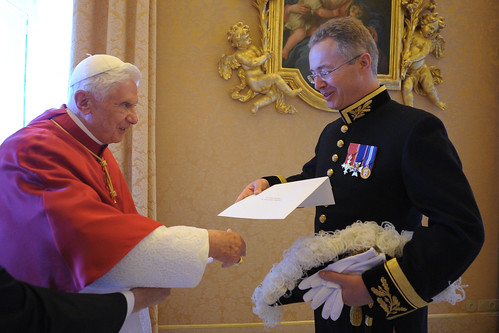11th January 2012
Looking ahead to 2012

The address of Pope Benedict XVI to the diplomatic corps accredited to the Holy See, at the start of each year, is always an opportunity to look ahead at the foreign policy challenges of coming months. 2012 was no exception, and I was struck by just how much of his Holiness’s wide ranging speech dovetailed with the priorities of the British Government.
In general terms the Pope, throughout this Christmas period, has focused on a number of key messages: human dignity as the basis of all public policies; the need to maintain a keen eye on the future and the upbringing of the next generation; a total rejection of violence – legitimised or otherwise – as a means to an end; and the imperative of respecting creation as we plot our future and that of the planet. There is little here with which we would disagree.
But it is also in specific policy areas where there is much alignment and room for collaboration. The Pope’s call for justice, peace and reconciliation in Africa, and particularly the priority of tackling the ongoing crisis in Somalia, are issues of priority for the Foreign Office – the United Kingdom will be hosting a major international conference on Somalia in February that seeks to draw together the international response to the problems facing that country and the wider Horn of Africa region. The ongoing transformation of the political scene in the Middle East and North Africa remains, for the Holy See and the UK, a situation both of hope and of concern. Pope Benedict highlighted the advances made at the Durban UNFCCC Climate Change Conference, and their significance for the well-being of the planet – like us, he also is looking ahead to the Rio plus 20 Summit later this year, where we expect the development of sustainable policies looking beyond the 2015 expiry of the Millennium Development Goals. Other priority areas, including tackling the global scourge of human trafficking, addressing the European economic crisis, and the need to monitor and strengthen freedom of religious belief across the world, offer great scope for working together between the Holy See and the British Government.
Commentators have characterised Pope Benedict’s address as “sombre”. We live in difficult times. But I also told Vatican Radio that 2012 will also be a year for celebration. In 2012, we are proud to host the Olympic Games, and to celebrate Her Majesty The Queen’s Diamond Jubilee. We shall continue to look forward, together, with hope and confidence.